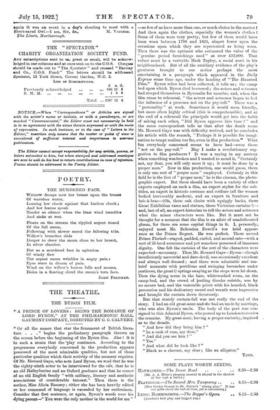THE THEATRE.
.1:11..h BYRON FILM.
4` A PRINCE OF LOVERS : BEING THE ROMANCE OF LORD BYRON," AT THE PHILHARMONIC HALL. GAUMONT COMPANY, DIRECTED BY C. C. CALVERT.
I` Or all the -names that star the firmament of British litera- ture . . " begins the preliminary paragraph thrown on the screen before the beginning of the Byron film. Alas ! it is In such a strain that the `play continues. According to the programme everybody concerned in the production appears possessed of the most admirable qualities, but not of those particular qualities which their activity of the moment requires. Of Mr. Howard Gaye, who scts Lord Byron, we read that he was the eighty-ninth actor to be interviewed for the role, that he is an old Halleyburian and an Oxford graduate and that he comes of an old Fresh family "with military, literary and aesthetic associations of considerable interest." Then there is the author, Miss Alicia Ramsey; either she has been heavily edited or her command of language is exceeded by her enthusiasm. Consider that first sentence, or again, Byron's words over his dying parent—" You were the only mother in the world for me " —so few of us have more than one, or much choice in the matter ! And then again the clothes, especially the women's clothes I Some of them were very pretty, but few of them would have been worn between 1788 and 1824, almost fewer upon the occasions upon which they are represented as being worn. Then there was the optimist who estimated the value of the " genuine period furnishings used " at over £12,000. That valuer must be a veritable Mark Tapley, a social asset in his neighbourhood. But of all the auxiliary evidence of the play's greatness brought to our notice perhaps the most entertaining is a paragraph which appeared in the Daily Express some time ago, under the heading of " The Haunted Film." Byron relics had been collected, it tells us ; the camp bed upon which Byron died borrowed ; the actors and actresses had steeped themselves in Byronalia for months; and, when the film came'to rehearsal, " the actors and actresses began to feel the influence of a presence not on the pay-roll." There was a " personality " at work. Sometimes it would seem friendly, but more often highly critical (this is comprehensible), and at the end of a rehearsal the principals would get into the habit of asking each other, "Did Byron approve this time ? " and the same correspondent tells us that after the death scene Mr. Howard Gaye was with difficulty revived, and he concludes his article with the remark, " Perhaps it is possible for imagi- nation to tempt realism too far, even in film production." What fun everybody concerned seems to have had—even those " not on the pay-roll." May I make a revolutionary sug- gestion to film producers ? It was a saying in my nursery when something was broken and I wanted to mend it, " Certainly not, my dear, you will only mess it up ; it must be done by a proper man." Now in film production, one would guess, there is only one sort of " proper man " employed. Certainly in this field he is the first of "proper men," he is the cinema, the photo- graphic expert. But there should have been a variety of other experts employed on such a film, an expert stylist for the sub- titles, an expert in historic costume and coiffure (all the women looked irrevocably modern), and an expert in furniture and brit-&-brac—(0h, those oak chairs with squiggly backs, those Great Exhibition vases and statues, those Victorian curtains 1)— and, last of all, an expert historian to tell the actors and actresses what the minor characters were like. But it must not be thought for a moment that the film is an affair of unadulterated gloom, for there are some capital things in it. I, personally, enjoyed most Mr. Bellendon Powell's too brief appear- ance as the Prince Regent. He was perfect. There moved Prince Florizel—stayed, padded, curled, and second-rate—with a sort of ill-bred assurance and yet somehow possessed of immense dignity. One felt the curtsies of the rest of the characters were expected—necessary. Then Mr. Howard Gaye—Byron—though insufficiently mercurial and dare-devil, was occasionally excellent and always well dressed ; and there were admirable and too- brief moments with postilions and swinging barouches under porticoes, the great C-springs swaying as the steps were let down. Then the dying scene in the bare, whitewashed room, on the camp-bed, and the crowd of jostling Greeks outside, was by no means bad, and the venerable priest with his bearded, black procession and his dedicatory sword and wreath were impressive -and brought the curtain down decorously.
But that stately curtain-fall was not really the end of the story. I had an old great-aunt and she had an uncle by marriage, who was also Byron's uncle. The body of the poet was con- signed to this Admiral Byron, who posted up to London to receive the remains. My great-aunt,-having a proper curiosity, inquired as to the details.
" And how did they bring him ? "
" In a cask of rum, my dear."
" And did you see him ? "
ft yea."
" And what did he look like ? "
" Black as a cheroot, my dear ; like an alligator." Tenn.


































 Previous page
Previous page